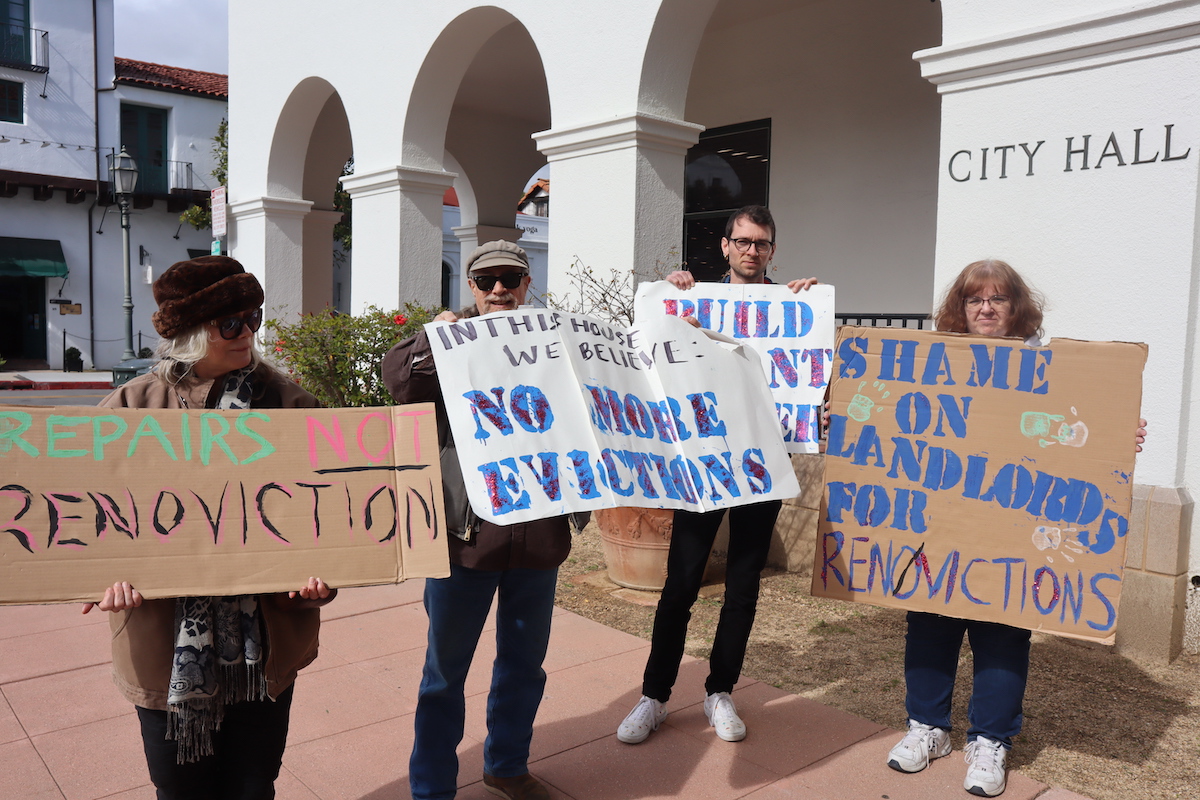Santa Barbara Passes Emergency Ordinance on Tenant Evictions
New Language in the Ordinance Requires Landlords to Show ‘Good Faith’ and Work Permits for Evictions

For the past month, Santa Barbara residents and housing advocates have flooded City Hall with comments, letters, and picket signs, pleading with city leaders to address a growing crisis of property owners displacing tenants in mass numbers using a method now known as “renoviction,” or evicting a tenant under the guise of a remodel in order to hike up rent prices.
In response, the City Council voted unanimously on Tuesday to amend the city’s code on rental evictions, tightening several sections to address “an urgent need to protect tenants from evictions,” according to the staff report presented to the council by Assistant City Attorney Dan Hentschke, “particularly evictions by owners using apparent loopholes in existing regulations to exploit and displace tenants.”
The city’s legal staff proposed changes to the no-fault eviction ordinance that would require landlords to act in “good faith,” and provide tenants with copies of permits along with an explanation of the scope of work for repairs before asking they vacate a unit.
The changes are consistent with the spirit of the original ordinance, Hentschke said, and would remove the wiggle room property owners could potentially read as loopholes to displace tenants.
Previously, the language said landlords just had to have a vague “intent” to occupy a unit, or withdraw the unit from the rental market, or remodel and make substantial repairs. There was no way of ensuring whether the owner would follow through with the intent.
“You would think that ‘intent to occupy’ implies good faith,” Hentschke said, “but we’ve learned that that’s not always the case. So, we want to make it clear that the recovery is for the purpose of really actually doing what you say you’re going to do.”
The language about landlords acting in “good faith” is now included in all four sections of the code — whether a property owner is asking a tenant to vacate the unit to occupy it themselves, to withdraw the unit from the rental market, to comply with a government order, or to demolish or substantially remodel the unit.
The amendments received a lot of attention during public comment, with supporters thanking the city for their quick response to the community and with opponents decrying the changes as a “tenant-centric disaster” and an “onerous restriction” for property owners in Santa Barbara.
Under the amended ordinance, landlords would now have to provide an early tenant notice; receive all necessary work permits before giving the notice; and serve the tenants with a copy of the permits with another written notice explaining the “reason for the termination, the type and scope of work, why the work cannot be reasonably done with the tenant in place, and why the work requires the tenant to vacate for at least 30 days.”
Several opponents to the emergency ordinance questioned the validity of the problem of “renovictions,” asking the council to take a step back and see if there was really a problem that would require these changes.
“This is a very real problem and it’s affecting very real people, many of whom are in this room today,” said Councilmember Kristen Sneddon. “It isn’t something that we just heard spring up overnight; this is a verified issue.”
Councilmember Meagan Harmon thanked the city’s residents who were consistent with their public comments, and she commended city staff: “You moved quickly, and because of your work, we’re taking this important step today.”
The council considered adding a few changes suggested in a letter signed by members of several local community organizations, including the county Legal Aid Foundation, Central Coast Alliance United for a Sustainable Economy, Santa Barbara County Action Network, Santa Barbara Tenants Union, Standing Up for Racial Justice, and Santa Barbara Young Democrats.
The letter suggested that the ordinance explicitly define “good faith” as “an honest intent without ulterior motive and an absence of a design to seek an unfair advantage.”
Instead of attempting to add in any language at the last minute, the council unanimously passed the amendments and language as recommended by staff, effective immediately, and in a separate motion, the council voted 6-1 to return at a later date to discuss the additions suggested by the housing advocates’ letter.



